- 产品特性
- 相关资料
- Q&A
- 参考文献
ES细胞・iPS细胞培养用血清代替品
StemSure® Serum Replacement
本产品是ES细胞和iPS细胞培养中使用的血清代替品。血清含有分化诱导因子,会导致干细胞分化。使用本产品代替血清,可在ES和iPS细胞培养的同时,保持他们的未分化状态,达到稳定培养。
本产品不含剧毒物质,将其作为普通物质处理。
使用本产品配制培养基培养的小鼠ES细胞,可用于制备嵌合体小鼠,并确认其种系传递。

◆特点•优势
● 可用于嵌合体小鼠制备,并确认其种系传递。
● 作为血清替代品,用于小鼠ES细胞・人IPS细胞培养。
● 不含剧毒物质。
◆案例•应用
1、嵌合体小鼠的制备与种系传递Update!!
将组装 HaloTag® cDNA 的目标载体导入小鼠ES细胞,用含有 StemSure® Serum Replacement(SSR)的培养基培养。确认载体导入小鼠ES细胞后,将其注入至 ICR 小鼠的胚盘胞,并移植至 ICR 小鼠的子宫。得到的嵌合体小鼠与 C57BL/6J 小鼠交配,获得F1小鼠。
(1) 嵌合体小鼠
收集嵌合体小鼠的血液,用 TRITC(四甲基若丹明异硫氰酸盐)对 HaloTag® 蛋白质染色。发现小鼠ES细胞源的 HaloTag® 的血液被染色,可确认为嵌合化。
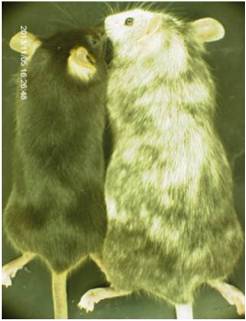
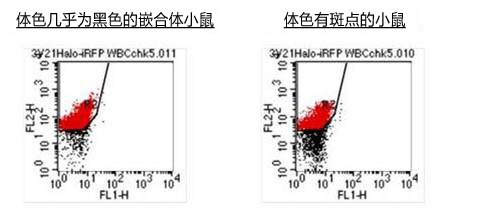
(2) F1小鼠
F1小鼠的血液发现 HaloTag® 存在,可确认用 SSR 培养基培养的ES细胞嵌合小鼠能够正常存活。
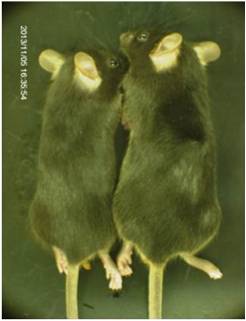
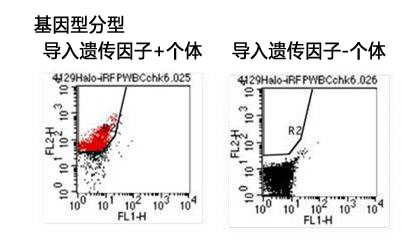
2、人iPS细胞201B7的培养
(1) 克隆形态与ALP染色
已确认可用 StemSure® Serum Replacement(SSR)培养人iPS细胞 201B7 株。ALP 染色呈阳性。
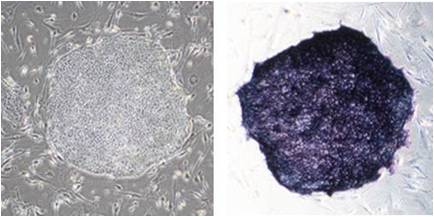
<培养基组成>
D-MEM/Ham's F-12 + 20% SSR + 2 mmol/L L-Glutamine +1×MEM Non-essential Amino Acids + 0.1 mmol/L StemSure® 2-Mercaptoethanol + 1×Penicillin-Streptomycin + 5 ng/mL bFGF
(2) 未分化标记的发现
使用 StemSure® Serum Replacement(SSR)培养的人iPS细胞201B7株,确认各种未分化标记(Sox2, Oct3/4, SSEA-3, SSEA-4, Tra-1-81)呈阳性。
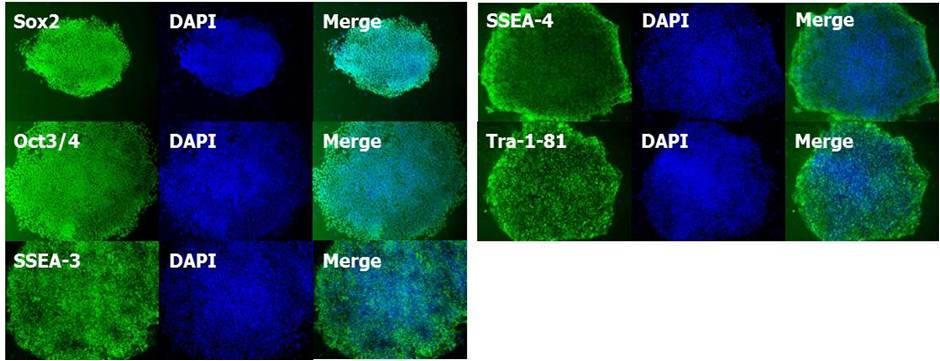
3、小鼠ES细胞D3的培养
(1) 细胞形态与ALP染色
使用 StemSure® Serum Replacement(SSR)培养小鼠ES细胞D3,能观察到小鼠ES细胞群特有的光泽,ALP染色呈阳性。
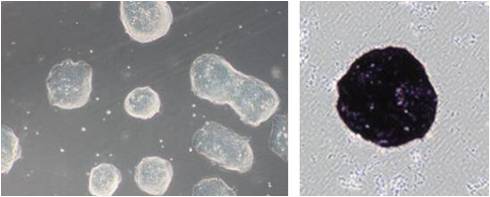
(2) 细胞增殖曲线
用不同培养基培养小鼠ES细胞D3进行14继代培养,比较细胞增殖。
如下图所示StemSure® 系列与A公司有同等的性能。
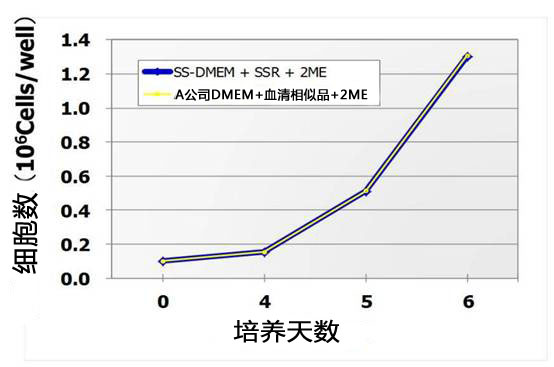
< StemSure® 系列培养基组成>
StemSure® D-MEM + 15% SSR + 2 mmol/L L-Glutamine + 1×MEM Non-essentialAmino Acids + 0.1 mmol/L StemSure® 2-Mercaptoethanol + 1×Penicillin-Streptomycin + 1,000 units/mL StemSure® LIF
(使用胶原包被的12孔板)
(3) 细胞群倍加数*
使用不同培养基对小鼠ES细胞D3进行继代培养,检查培养天数与细胞群倍加数的关系。
下图显示 StemSure® 系列与A公司产品的细胞群倍加数相同。
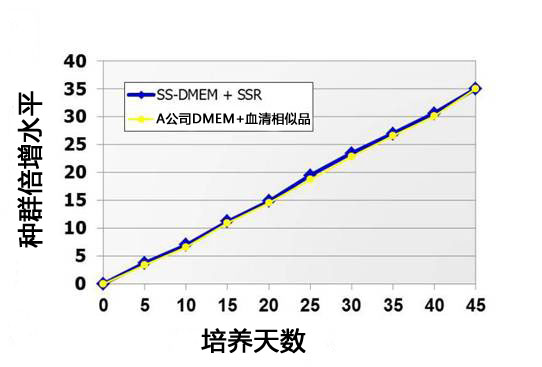
*细胞群倍加数 cell population doubling level,缩写PDL,指从培养开始至现在细胞群的倍增次数。
<培养基组成>
StemSure® D-MEM + 15% SSR + 2 mmol/l L-Glutamine + 1×MEM Non-essentialAmino Acids + 0.1 mmol/l StemSure® 2-Mercaptoethanol + 1×Penicillin-Streptomycin + 1,000 units/ml StemSure® LIF
(使用胶原包被的12孔板)
(4) 未分化标记的检测
使用 StemSure® 系列对小鼠ES细胞D3进行5代继代培养,各种未分化标记(Nanog, Oct3/4, Sox2, SSEA-1)呈阳性。

<培养基组成>
StemSure® D-MEM + 15% SSR + 2 mmol/L L-Glutamine + 1×MEM Non-essential Amino Acids + 0.1 mmol/L StemSure® 2-Mercaptoethanol+ 1×Penicillin-Streptomycin + 1,000 units/mL StemSure® LIF
4、畸形瘤的形成
用 StemSure® 系列对小鼠ES细胞D3进行继代培养。对免疫不全小鼠的皮下注射培养后细胞。在形成皮下畸形瘤,其内部检测出神经组织(外胚叶源)、软骨组织(中胚叶源)、管腔结构纤毛上皮(内胚叶源)。

<培养基组成 >
StemSure® D-MEM + 15% SSR + 2 mmol/L L-Glutamine + 1×MEM Non-essential Amino Acids + 0.1 mmol/L StemSure® 2-Mercaptoethanol+ 1×Penicillin-Streptomycin + 1,000 units/mL StemSure® LIF
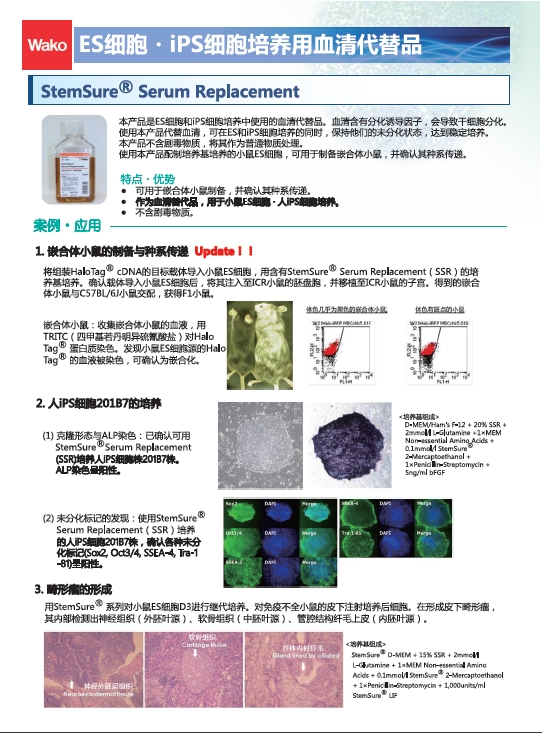 |
|
ES细胞・iPS细胞培养用血清代替品 |
★StemSure® 系列★
StemSure® 系列可培养ES细胞和iPS細胞。使用小鼠ES细胞D3检测每批产品的品质。
● StemSure® D-MEM・巯基乙醇,硫代甘油
● StemSure® 明胶溶液
● StemSure® LIF, 小鼠, 重组. 溶液,
● StemSure® 冻存溶液
|
产品编号 |
产品名称 |
等 级 |
规 格 |
价格 |
保存温度・法规情报 |
|
|
197-16275 |
StemSure® D-MEM (High Glucose) with Phenol |
细胞培养用 |
500 mL |
询价 |
||
|
198-15781 |
StemSure® 10mmol/l 2-Mercaptoethanol Solution |
细胞培养用 |
100 mL |
询价 |
||
|
195-15791 |
StemSure® 50mmol/L Monothioglycerol Solution |
细胞培养用 |
100 mL |
询价 |
||
|
190-15805 |
StemSure® 0.1w/v% Gelatin Solution |
细胞培养用 |
500 mL |
询价 |
||
|
199-16051 |
StemSure® LIF, Mouse, recombinant, Solution |
细胞培养用 |
106 units 106 units×10 |
询价 |
||
|
195-16031 |
StemSure® Freezing Medium |
细胞培养用 |
100 mL |
询价 | ||
已有案例引用的培养基配方
iPSC培养基组成如下:含15%StemSure Serum Replacement(197-16775; Wako Pure Chemical Industries) DMEM / F12,1%抗生素 – 抗真菌混合溶液,1%非必需氨基酸(139-15651; Wako Pure Chemical Industries ),2mM谷氨酸(16948-004; Nacalai Tesque)和0.1mMβ-巯基乙醇(21438-82; Nacalai Tesque)。文献全文请点击参考文献页面。
|
1. |
Obora, K., Onodera, Y., Takehara, T., Frampton, J., Hasei, J., Ozaki, T., … & Fukuda, K. (2017). Inflammation-induced miRNA-155 inhibits self-renewal of neural stem cells via suppression of CCAAT/enhancer binding protein β (C/EBPβ) expression. Scientific reports, 7, 43604.【mouse neural stem cell (NSC)】 |
|
2. |
Aihara, A., Koike, T., Abe, N., Nakamura, S., Sawaguchi, A., Nakamura, T., … & Eto, K. (2017). Novel TPO receptor agonist TA-316 contributes to platelet biogenesis from human iPS cells. Blood advances, 1(7), 468-476. |
|
3. |
Katayama, M., Kiyono, T., Kuroda, K., Ueda, K., Onuma, M., Shirakawa, H., & Fukuda, T. (2019). Rat-derived feeder cells immortalized by expression of mutant CDK4, cyclin D, and telomerase can support stem cell growth. Biochimica et Biophysica Acta (BBA)-Molecular Cell Research, 1866(5), 945-956. |
|
4. |
Katayama, M., Hirayama, T., Horie, K., Kiyono, T., Donai, K., Takeda, S., … & Fukuda, T. (2016). Induced pluripotent stem cells with six reprogramming factors from prairie vole, which is an animal model for social behaviors. Cell transplantation, 25(5), 783-796.【prairie vole-derived iPSCs(pv-iPSCs)】 |
|
5. |
Kawata, M., Taniguchi, Y., Mori, D., Yano, F., Ohba, S., Chung, U. I., … & Saito, T. (2017). Different regulation of limb development by p63 transcript variants. PloS one, 12(3), e0174122.【基因编辑小鼠iPS细胞】 |
|
6. |
Bui, P. L., Nishimura, K., Mondejar, G. S., Kumar, A., Aizawa, S., Murano, K., … & Ito, Y. (2019). Template Activating Factor-I α Regulates Retroviral Silencing during Reprogramming. Cell reports, 29(7), 1909-1922. 【Mouse embryonic fibroblasts (MEFs) 】 |
|
7. |
Sumi, S., Kawagoe, M., Abe, R., Yanai, G., Yang, K. C., & Shirouzu, Y. (2017). A multiple-funnels cell culture insert for the scale-up production of uniform cell spheroids. Regenerative therapy, 7, 52-60. |
|
8. |
古田明日香, & 中村肇伸. (2019). ES 細胞は代謝シフトを介して全能性細胞へと変化する. In 日本繁殖生物学会 講演要旨集 第 112 回日本繁殖生物学会大会 (pp. AW1-5). 日本繁殖生物学会. |
|
9. |
Onozato, D., Yamashita, M., Nakanishi, A., Akagawa, T., Kida, Y., Ogawa, I., … & Matsunaga, T. (2018). Generation of intestinal organoids suitable for pharmacokinetic studies from human induced pluripotent stem cells. Drug Metabolism and Disposition, 46(11), 1572-1580. |
|
10. |
Hayashi, Y., Matsumoto, J., Kumagai, S., Morishita, K., Xiang, L., Kobori, Y., … & Sumaru, K. (2018). Automated adherent cell elimination by a high-speed laser mediated by a light-responsive polymer. Communications biology, 1(1), 218.【hiPSC differentiation】 |
|
11. |
Osafune, K., Toyoda, T., Takekawa, S., Nakamura, G., & Ito, R. (2019). U.S. Patent Application No. 16/490,394. |
|
12. |
Kato, T., Kanemura, Y., Shofuda, T., & Fukusumi, H. (2016). U.S. Patent Application No. 14/900,975. |
|
13. |
Eitoku, M., Kato, H., Suganuma, N., & Kiyosawa, H. (2018). Markers associated with neuron-specific Ube3a imprinting during neuronal differentiation of mouse embryonic stem cells. Cytotechnology, 70(1), 45-53. |
|
14. |
Onozato, D., Yamashita, M., Fukuyama, R., Akagawa, T., Kida, Y., Koeda, A., … & Matsunaga, T. (2018). Efficient generation of Cynomolgus monkey induced pluripotent stem cell-derived intestinal organoids with pharmacokinetic functions. Stem cells and development, 27(15), 1033-1045. |
|
15. |
Katayama, M., Hirayama, T., Kiyono, T., Onuma, M., Tani, T., Takeda, S., … & Fukuda, T. (2017). Immortalized prairie vole-derived fibroblasts (VMF-K4DTs) can be transformed into pluripotent stem cells and provide a useful tool with which to determine optimal reprogramming conditions. Journal of Reproduction and Development, 2016-164. |
|
16. |
Matsuyama, A., & Okura, H. (2017). U.S. Patent No. 9,644,181. Washington, DC: U.S. Patent and Trademark Office. |
|
17. |
Tomizawa, M. (2016). Culture Medium And Method For Inducing Differentiation of Pluripotent Stem Cells To Hepatoblasts. U.S. Patent Application No. 14/749,715. |
| 产品编号 | 产品名称 | 产品规格 | 产品等级 |
| 191-18375 | Stemsure® Serum Replacement Stemsure®血清替代品 |
500 mL | 细胞培养用 |
